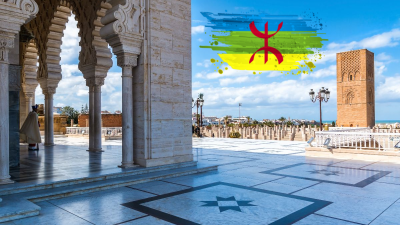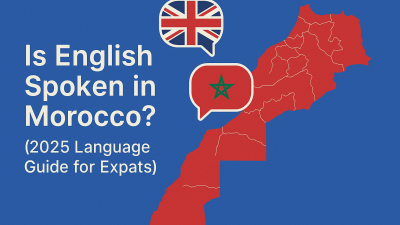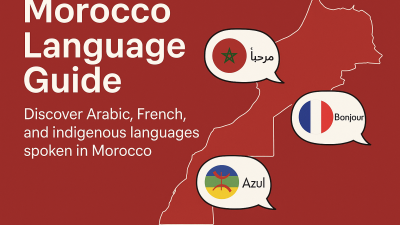When people search online for the language for Morocco, they usually want to know: what language do Moroccans speak every day, and what is the official Morocco national language? The answer is not as simple as naming one tongue. Morocco is one of the most linguistically diverse countries in North Africa, where several languages coexist: Arabic (Darija and Classical Arabic), Amazigh (Berber), French, and increasingly English.
This unique blend of languages forms the fabric of the Morocco language identity. It reflects the country’s deep history, multicultural influences, and modern ambitions. For expats, travelers, or students preparing to live in Morocco, understanding this mix is essential to building connections and navigating daily life.
In this article, we’ll break down the official Morocco national languages, explain how they are used, explore Morocco’s multilingual reality, and share tips on learning Moroccan Arabic with the help of experts like Abdelwahed Tabaallout, founder of Daily Darija.
What Is the Language for Morocco?
The language for Morocco is not just one. Officially, Morocco recognizes two national languages:
- Arabic – specifically Classical Arabic for official and religious contexts, and Darija (Moroccan Arabic) for daily conversation.
- Amazigh – the indigenous Berber language, spoken across many regions and officially recognized since the 2011 Constitution.
Alongside these, French plays a strong role due to Morocco’s colonial history, particularly in administration, education, and business. In recent years, English has been rising in importance as Morocco expands its global partnerships.
So, when someone asks, “What is the language for Morocco?” the answer is: Arabic and Amazigh are the official ones, but you’ll hear French everywhere, and English is growing fast.
Morocco National Language(s): Arabic and Amazigh
Arabic in Morocco
Arabic is at the heart of Moroccan identity. But it exists in two main forms:
- Classical Arabic (Fusha): The formal language used in schools, mosques, laws, and official speeches. It’s close to the Arabic used across the Arab world.
- Darija (Moroccan Arabic): The everyday spoken dialect of Arabic unique to Morocco. Darija blends Arabic with Amazigh, French, and even Spanish words. For example, Moroccans say “tomobil” for car (from French automobile).
Darija is not usually written, but it is everywhere in songs, social media, and street conversations. For expats and visitors, learning some Darija is the best way to connect with Moroccans.
Amazigh in Morocco
The Amazigh language (sometimes called Tamazight or Berber) is the oldest living language of Morocco. It has several regional varieties such as Tarifit in the north, Tamazight in the Atlas Mountains, and Tachelhit in the south.
Since 2011, Amazigh has been recognized as a Morocco national language, and it is now taught in schools. Road signs, government documents, and even banknotes often include Amazigh script alongside Arabic.
Amazigh carries deep cultural significance, connecting modern Moroccans with their ancestral roots.
Morocco Language in Daily Life
If you visit Morocco, you’ll quickly see that language in Morocco is not black and white—it’s a colorful mix. Here’s how it works in practice:
- At home and in markets: Most people use Darija, the Morocco language of daily life.
- In rural areas: Many communities use Amazigh in addition to Darija.
- In schools and government: Classical Arabic is dominant, with French used in technical fields.
- In business and law: French is still the working language of contracts, finance, and administration.
- With tourists: Many young Moroccans switch easily into English or Spanish.
This multilingual flexibility is a hallmark of Moroccan culture.
The Role of French and English
French in Morocco
Though not an official Morocco national language, French holds a special place. Introduced during the colonial era, French remains the language of higher education (science, engineering, medicine), international business, and government reports.
If you open a Moroccan bank account or read a product label, chances are it will be in French. For many Moroccans, French is a second language learned in school from a young age.
English in Morocco
In the last decade, Morocco has increasingly turned toward English. The government has encouraged its use in universities and international trade. Youth and professionals see English as the key to global opportunities.
Today, Morocco is even introducing English into high school curricula, aiming to make it a language of science and technology.
So, while the Morocco national languages are Arabic and Amazigh, French and English are crucial for modern life.
How to Learn the Moroccan Language (Darija)
Learning Darija can be challenging for foreigners, but it is rewarding. Unlike French or English, Darija is not standardized in writing and changes from region to region. Still, it is the real language for Morocco—the one you’ll hear in taxis, cafes, and football stadiums.
Some tips for learning Darija:
- Start with greetings and daily expressions: “Salam” (hello), “Shukran” (thank you), “Bslama” (goodbye).
- Listen to Moroccan music and watch Moroccan TV shows.
- Practice with locals, who are usually friendly and patient.
- Use structured learning resources designed for foreigners.
This is where dedicated educators like Abdelwahed Tabaallout play a crucial role.
Spotlight: Abdelwahed Tabaallout and Daily Darija
Abdelwahed Tabaallout is a Moroccan educator, blogger, and founder of Daily Darija, an online platform that teaches Moroccan Arabic in an accessible way. Growing up in Morocco, Abdelwahed has dedicated his career to making Darija understandable for learners around the world.
His most popular resource is the Moroccan Darija Workbook for Beginners, a practical guide full of exercises and answer keys. This book has helped thousands of learners break through the initial barrier of understanding Darija.
Through Daily Darija, Abdelwahed shares:
- Daily Darija lessons and videos.
- Cultural explanations to put words in context.
- Tips on grammar, vocabulary, and pronunciation.
For anyone searching about the language for Morocco, Abdelwahed’s work is a bridge between cultures, offering tools to truly understand the Moroccan way of speaking.
Why Language Matters for Moving to Morocco
If you’re planning to move, work, or retire in Morocco, learning about the Morocco national language and daily speech is essential.
- Renting an apartment? You’ll need Darija or French.
- Taking a taxi? Darija will help.
- Visiting a local souk? Bargaining works best in Darija.
- Opening a bank account? French dominates.
- Making friends? A few words in Darija go a long way.
At Settle in Morocco, we’ve seen how expats who learn some Darija or Amazigh adapt much faster and feel more at home.
Language is more than communication—it’s the key to understanding Moroccan culture, traditions, and hospitality.
FAQs About the Language for Morocco
1. What is the official Morocco national language?
Morocco recognizes Arabic and Amazigh as its two official national languages.
2. Is French an official language in Morocco?
No, French is not official, but it is widely used in government, business, and education.
3. Do people in Morocco speak English?
Yes, especially younger generations. English is growing fast and is now part of the education system.
4. How hard is it to learn Moroccan Arabic (Darija)?
Darija can be challenging at first, but with resources like Daily Darija and Abdelwahed Tabaallout’s workbook, learners can progress quickly.
5. What’s the best way to prepare before moving to Morocco?
Learn basic Darija phrases, understand some French, and explore resources like Abdelwahed Tabaallout’s Moroccan Darija Workbook.
Conclusion
The language for Morocco is a mosaic of Arabic, Amazigh, French, and English. The Morocco national languages of Arabic and Amazigh reflect its heritage, while French and English shape its modern identity.
For expats, travelers, or anyone interested in Moroccan culture, learning Darija—the true Morocco language of daily life—is the best way to connect with people. Thanks to educators like Abdelwahed Tabaallout, resources are now more accessible than ever, helping learners embrace Morocco’s multilingual reality.


